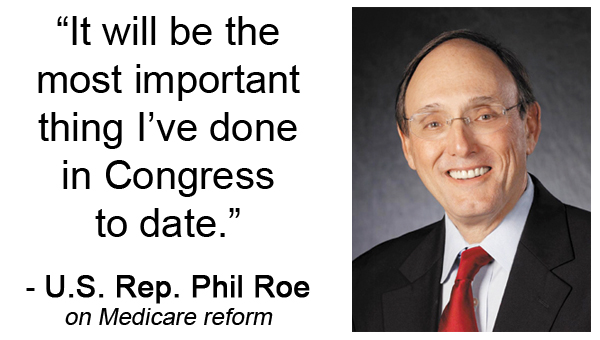Roe: Congress taking aim at Medicare cuts, Affordable Care Act
Published 8:31 am Friday, March 20, 2015
Health care tops the agenda right now in Washington, D.C., as a few different actions are up for consideration.
“A lot of important things are going on in the next two weeks,” said U.S. Rep. Phil Roe, R-Tenn.
Possible changes to the structure of Medicare is one of the biggest things up for debate at this time, Roe said
“It will be the first structural change to Medicare in 20 years,” Roe said of current legislation. “It will be the most important thing I’ve done in Congress to date.”
The legislation up for debate would change Medicare to remove the mandatory cuts to payments made to doctors under the program’s sustainable growth rate provision.
When the amount Medicare pays the doctors goes down, Roe said, the patient is left responsible for the balance. This makes health care less affordable and leads some to not seek the medical treatment they need, he said.
The SGR system was put in place through the Balanced Budget Act of 1997, and designed to control the costs of Medicare payments to doctors. Under the SGR formula, if overall costs exceed target expenditures, across-the-board reductions in payments occur.
This year, if Congress does not act by the end of March, payments made to physicians through the program would be cut by more than 20 percent.
In the past, Congress has passed temporary fixes to keep the cuts from happening, a practice that has been dubbed “kicking the can down the road” on Capitol Hill. It is time to stop that practice and support a permanent solution, Roe said.
“I’m tired of patches. That is why I have put my shoulder down and worked so hard on this,” he said. “It has to get better. No more kicking the can down the road.”
The changes to Medicare are part of a bipartisan effort, Roe said.
“If former Speaker (Nancy) Pelosi was not working with Speaker (John) Boehner, it would not be as far along as it is,” he said, adding his has confidence the measure will pass.
Another health care reform looming on the horizon is a Republican effort to eliminate the Affordable Care Act. The proposal being considered by the Republicans would use the “reconciliation” aspect of the Senate budget to end the controversial health law.
Reconciliation is a legislative process used by the U.S. Senate designed to allow consideration of a budget bill with debate limited to 20 hours under Senate rules.
To trigger the process, Congress passes a concurrent resolution on the budget instructing one or more committees to report changes in law affecting the budget by a certain date. The budget is sent to both houses of Congress for approval, but it goes to the Senate with a special rule: it can pass with a simple majority of 51 votes and cannot be filibustered. Other legislation can be filibustered and requires 60 votes to end the filibuster.
Currently, Congress is waiting to hear the results of a federal ruling to see if the reconciliation process can be used to end the Affordable Care Act, Roe said.
Until that ruling comes through, Roe said he did not want to comment further on what could happen with the process.





